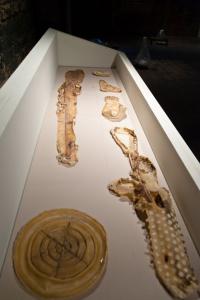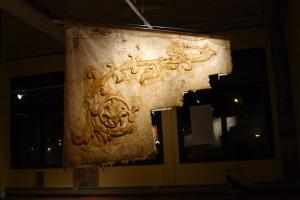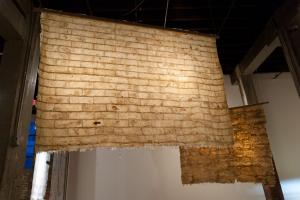
Latex panel from Martyred Intellectuals Monument in Rayer Bazar, Dhaka, Bangladesh in Broken Column exhibit, by Pritika Chowdhry.
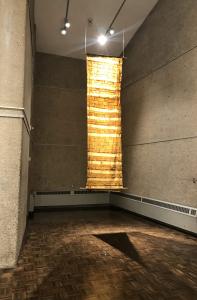
Latex panel from Martyred Intellectuals Monument, in Rayer Bazar, Dhaka, Bangladesh in Broken Column exhibition, by Pritika Chowdhry.
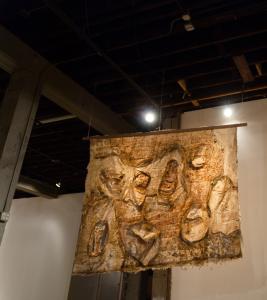
Latex panels of Jalladkhana Killing Field Museum, in Dhaka, Bangladesh, in Broken Column exhibition, by Pritika Chowdhry.
The Partition Memorial Project Raises Consciousness about Rape as a Weapon of War
Socio-political artist and curator Pritika Chowdhry founded the Partition Memorial Project in 2007 and is joining the festivities of Victory Day with a controversial exhibit. The Partition Memorial Project aims to raise consciousness about the systematic rape of over 200,000 to 400,000 Bangladeshi women during the Bangladesh Liberation War. Rape was extensively used as a weapon of war in this genocide to wound and humiliate the people of Bangladesh.
Chowdhry says, "the use of rape as a weapon of war in 1971 is a complicated issue," and that "the widespread use of rape against women is the counter-memory of the Bangladesh Liberation War." While wartime rape in 1971 has been kept in the public memory, it has been done by using the trope of the "Birangona". This framing is problematic because it erases the lived experience of the women themselves.
The women victims of wartime rape in Bangladesh are referred as "Birangonas," or brave women. However, state actors use this term as propaganda to create a narrative of victim nationalism that leaves the actual "Birangonas" in an impossible situation of national eulogization but ostracization in their villages and families.
"When a memory is unbearable, how do you memorialize it?" asks Chowdhry. Chowdhry did an artist residency in Dhaka at the Britto Arts Trust in 2013 and did research on three national monuments in Dhaka - the Martyred Intellectuals Memorial, the Liberation War Museum, and the Jalladkhana Killing Fields Museum.
"The Birangona" and her trauma was absent from these national monuments," says Chowdhry. "Traditional monuments and memorials seem inadequate to memorialize such an inexpressible issue. I felt that what is needed is an anti-memorial that will help people understand the trauma of the "birangona" in a deep way," Chowdhry continued.
In these anti-memorials, Chowdhry also draws parallels with the use of rape as a weapon of war in the 1947 Partition of India, by examining monuments in Pakistan and India. Her anti-memorials also expose the ongoing use of rape as a weapon in ethnic conflicts and communal riots in the South Asian sub-continent.
Chowdhry is a counter-memory expert and an anti-memorial specialist. In the Partition Memorial Project, her anti-memorials are quietly provocative, temporary, and incorporate visceral materials and soundscapes. Chowdhry emphasizes that her goal is not necessarily to "speak for the women" or "give a voice to the voiceless" because that would be another kind of silencing for the women. Her experiential art installations invite viewers to be in the space, in the act of bearing witness, holding space, mourning, remembrance, and repair.
The anti-memorials are thought-provoking art installations that flip the idea of traditional monuments and memorials on its head. Chowdhry says, "it is important not to forget such atrocities because if we forget, we are bound to create conditions that will enable history to repeat itself."
ABOUT THE PARTITION MEMORIAL PROJECT
The Partition Memorial Project comprises seven anti-memorials that examine various aspects of the Partition of India in 1947, and the Bangladesh Liberation War in 1971, and the ongoing communal riots and ethnic conflicts in the South Asian sub-continent. In addition, it also examines partitions of other countries and raises awareness about rape as a weapon of war in partitions and civil and military wars.
Founded in 2007 by socio-political activist artist, Pritika Chowdhry has an MFA in Studio Art and an MA in Visual Culture and Gender Studies from the University of Wisconsin, Madison. She has exhibited her artworks internationally and in public and private collections and is Senior Curator at the South Asia Institute of Chicago and a Board Member of the Woman Made Gallery in Chicago.
For more information, visit The Partition Memorial Project on Facebook and Instagram. For additional information, please visit https://www.partitionmemorialproject.org.
Pritika Chowdhry
Partition Memorial Project
+1 6082391306
email us here
Visit us on social media:
Facebook
Twitter
LinkedIn
Other
Partition Art | BROKEN COLUMN - Dhaka edition

